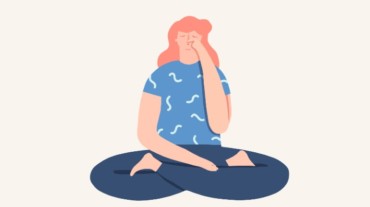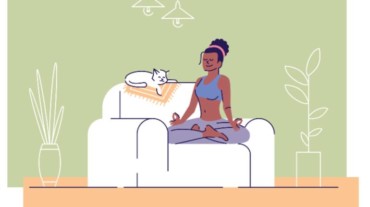
The covid-19 pandemic is not just biological in nature. A psychological pandemic has been much like a shadow—not in the limelight but still very much present—progressing hand in hand with the global covid-19 pandemic.
The mental health of people has taken a toll for the worse. Dealing with the death of loved ones and/or fearing losing your loved ones to the virus can result in feelings of uneasiness and anxiety. Loss of jobs, financial hits, work-related stress, and uncertainty of the future also add impetus to the strain caused to the mind.
In addition to this, the lockdown has led to restrictions on several activities, some of which people previously used to alleviate stress–like shopping, going to the movies, eating out, exercising outdoors or at the gym, and social interactions with friends and family. Coronavirus has dismantled the idea of ‘normalcy’ in human life across the globe and the psychological trauma is inevitable.
However, the increased time indoors has also forced some to quickly adapt to the changed circumstances and attempt to take their physical and mental health in their own hands. Taking to various hobbies or discovering new ways of inculcating exercise in your daily routine via ‘home workouts’ are some of the things that have seen to be trending during this quarantine season.

Yoga is one such practice, which is designed to promote physical, mental, emotional and spiritual well-being.
Here’s how yoga can help you deal with covid stress
It has been stressed that along with physical well-being, mental peace and a positive attitude also play an important role in the fight against the pandemic. This is where yoga comes in.
Yoga means joining the mind with the body, in a harmonious development. It envisages health in totality on the principle of ‘healthy mind in a healthy body’. It is an art and science of healthy living. Yoga helps to build up emotional harmony and manage daily stress and its consequences.
While yoga and meditation are known to be beneficial for holistic health, there is no proof so far that they help the human body to fight coronavirus, which has infected over four lakh people in India so far.
However, several studies on using yoga in managing flu symptoms during influenza season have shown promising results. Also, people who have recovered from infectious diseases have narrated how along with diet and medicines, yoga helped them in the recovery process.

Yoga could be useful in this COVID-19 pandemic in three ways
Select Topics of your interest and let us customize your feed.
PERSONALISE NOWYoga is an excellent tool to help improve respiratory health and immunity, both of which are involved in the prevention and healing from covid-19.
Yoga is composed of: stretching exercises and physical postures (asanas), breath control (pranayama) and concentration techniques (meditation). Yoga may directly stimulate the vagus nerve, thus increasing the parasympathetic activity. At the same time, it pacifies the sympathetic nervous system and slows down the heart, while teaching the muscles and mind to relax.
So, which yoga poses can help?
Some asanas or yoga poses work better than others in helping to modulate the physiological response to stressors. Cooling poses, such as forward bends where the head is supported, are very useful— they bring a sense of calm to the head, neck, and face.
Simple asana and pranayama can stimulate production of happy hormones or endorphins. Pranayama or conscious breathing quickly lowers blood pressure and also helps in improving respiratory health. Surya namaskar involves synchronizing breathing with body movement and has been shown to increase muscle strength and body endurance, improve spinal flexibility and improve immunity. Meditation is a great option to incorporate into your regular routine to reduce anxiety and stress.
Also, watch:
The function of the immune system is critical in the human response to infectious disease. Nitric oxide has been recognized as one of the vital factors in the immune system. Bhramari (humming) has been shown to greatly increase nasal nitric oxide, which when released into the bloodstream acts as a vasodilator, decreases blood pressure, improves blood flow to the organs, causes anti-inflammatory action in the arteries and boosts immune defense.
Thus, yoga can prove to be extremely helpful for both the mind and the body in these unprecedented times. It is clear that we have to live with the virus until a vaccine is found. Until then, besides practicing social distancing, wearing a face mask and washing hands regularly, learning the practice of yoga might help us in tiding over this crisis.
Get Latest Updates on Preventive Care, Family Care, Reproductive Care, Self Care